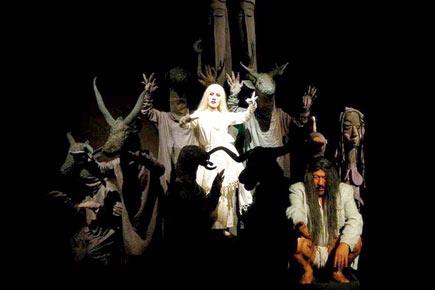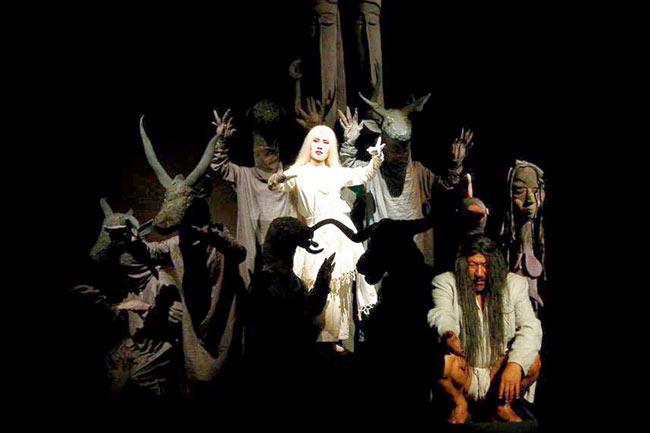Mumbai University’s Academy of Theatre Arts has been doing good work (with a minimum of fuss) at its verdant Kalina campus. Waman Kendre moved to head the National School of Drama in Delhi, handing over charge to well-known Shafaat Khan, who was on the faculty for years


Mumbai University’s Academy of Theatre Arts has been doing good work (with a minimum of fuss) at its verdant Kalina campus. Waman Kendre moved to head the National School of Drama in Delhi, handing over charge to well-known Shafaat Khan, who was on the faculty for years.
ADVERTISEMENT
 Rare treat: Chorus Repertory play was staged at the four-day festival, which was organised by the Mumbai University’s Academy of Theatre Arts
Rare treat: Chorus Repertory play was staged at the four-day festival, which was organised by the Mumbai University’s Academy of Theatre Arts
Every year, World Theatre Day (March 7) is celebrated there with gusto. This year a four-day event, Rashtriya Maharang Parishad, was organised, that brought together legends of Indian Theatre, like Ratan Thiyam, Kavalam Narayana Panikkar, Rajinder Nath, Rudraprasad Sengupta, Neelam Mansingh, Ramgopal Bajaj, MK Raina… the list goes on. A theatre lover could wander around all day gawking.
Which raises the question, why is theatre in Mumbai increasing, but the tribe of theatre lovers decreasing?
There used to be a time when people used go miles to see a play by a great director; today they flock to stand-up comedy show, or a production starring a celebrity. Art, it seems, it not worthy of attention if it is not packaged as entertainment.
A part of the blame could lie with hectic city living, when, after a tiring day at work and an exhausting commute, people just don’t have the energy to go watch a play. And on weekends, they are looking for an entertainment fix.
Once in a while, a play that doesn’t fall into the ‘popular’ category may attract crowds, but by and large, it’s a tough grind for the experimental theatrewallas. And costs are not getting any easier to bear. With very little corporate or government backing available, theatre has to make do any which way, mostly the dedication of people who earn a living elsewhere and pour it into theatre. A large part of the theatre done in this country is fuelled by passion.
Even today, when everything is dictated by commercial gain, theatre folk are slightly embarrassed if they make a lot of money. They are happy to travel by train and bus and stay in guest houses or fleabag hotels if it means reaching an appreciative audience in another town.
Theatre is still a community activity, where groups work together and form a family-like support system for themselves, and this kind of warmth is not found in any other field.
Shows in Mumbai are seldom cancelled and the ‘show must go on’ credo taken very seriously. If an actor is unable to do a show, another will chip in, often learning lines overnight and getting on stage without adequate rehearsal time, sure of the ability of fellow actors to cover up flaws. True blue theatrewallas call themselves crazy, and it is a glorious kind of madness.
Among the various sessions at the Maharang Parishad, there was one on Festivals, and there were interesting anecdotes shared on how theatre festivals were started and how they run, and Sanjna Kapoor made an important point about creating a network of theatre practitioners, so that festivals can be organised in every town. Never mind that there are no facilities in many places, not even a proper auditorium, but theatre folk can perform anywhere. If there is an audience there is theatre — in a tent, in a field, in a factory, warehouse or slum.
If theatre practitioners are united, they can also form a power group and demand funding from the government, but mainly the network would help people who work in their own remote spaces to keep in touch with others like themselves, to encourage one another, to share information, resources and their own brand of madness.
It would also help audiences everywhere to see the work being done across the country. Ratan Thiyam is (and Habib Tanvir was) big enough to attract audiences everywhere, but it had taken years of consistent hard work to reach there. Audience sat with rapt attention even when they did not understand a word of the dialogue.
But some of the actors whose names are not known, could put to shame some of our stars who think they are talented.
It is important to cultivate an audience that loves and appreciates culture in all forms and that can only happen if they are exposed to it and at an early age — if children are not introduced to the delights of theatre (and other arts) at a young age, they are not going grow up to be connoisseurs.
Never seeing a play or attending concert or visiting an art exhibition will not interfere in their climb up the career ladder; it will not hamper their ability to do business or make money, but a vital component would be missing from their lives. What that might be… ask the mad artiste.
Deepa Gahlot is an award-winning film and theatre critic and an arts administrator. You can follow her on twitter @deepagahlot
 Subscribe today by clicking the link and stay updated with the latest news!" Click here!
Subscribe today by clicking the link and stay updated with the latest news!" Click here!







